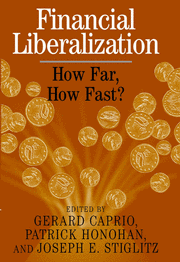Book contents
- Frontmatter
- Contents
- List of Contributors
- Preface
- ANALYTICS
- CROSS-COUNTRY EVIDENCE
- LIBERALIZATION EXPERIENCE FROM CONTRASTING STARTING POINTS
- 5 Financial Restraints and Liberalization in Postwar Europe
- 6 The Role of Poorly Phased Liberalization in Korea's Financial Crisis
- 7 Interest Rate Spreads in Mexico during Liberalization
- 8 The Financial Sector in Transition: Tales of Success and Failure
- 9 Indonesia and India: Contrasting Approaches to Repression and Liberalization
- 10 Reforming Finance in a Low Income Country: Uganda
- Index
7 - Interest Rate Spreads in Mexico during Liberalization
Published online by Cambridge University Press: 12 January 2010
- Frontmatter
- Contents
- List of Contributors
- Preface
- ANALYTICS
- CROSS-COUNTRY EVIDENCE
- LIBERALIZATION EXPERIENCE FROM CONTRASTING STARTING POINTS
- 5 Financial Restraints and Liberalization in Postwar Europe
- 6 The Role of Poorly Phased Liberalization in Korea's Financial Crisis
- 7 Interest Rate Spreads in Mexico during Liberalization
- 8 The Financial Sector in Transition: Tales of Success and Failure
- 9 Indonesia and India: Contrasting Approaches to Repression and Liberalization
- 10 Reforming Finance in a Low Income Country: Uganda
- Index
Summary
INTRODUCTION
In periods of increased volatility and crisis the concept of economic liberalization comes under rigorous scrutiny, and even attack. In Mexico as elsewhere, stressful conditions often lead to liberalization being blamed for all the ills of the domestic and international economies. A closer examination of Mexican financial liberalization reveals a much more complex story.
The particular objective of this chapter is to examine the interest rates and bank spreads in Mexico during a financial liberalization which took place against a background of relatively high and volatile rates of interest and inflation, and under diverse exchange-rate regimes.
The chapter begins with an overview of Mexico's process of financial liberalization in a rapidly changing macroeconomic and external environment. We then examine the consequences of liberalization for monetary aggregates and for the evolution of interest rates and interest spreads, showing in particular that while spreads may not be necessarily lower under financial repression, they are certainly much less transparent. Finally, we compare elements of the Mexican experience with other high inflation cases, before offering some concluding remarks.
THE FINANCIAL LIBERALIZATION PROCESS AND MACROECONOMIC TURNING POINTS
Turning Points
Mexico's recent financial and macroeconomic history is punctuated by several major turning points. The first one occurred in 1982, with an exchange-rate crisis, high inflation, and the nationalization of the banking system. The second (1988–89) involved interest rate liberalization and an end to high inflation. The third (1991–92) consisted of bank reprivatization, which took place under manageable yet unstable macroeconomic conditions. The fourth and final turning point (1994) was precipitated by the shock of the Tequila Crisis.
- Type
- Chapter
- Information
- Financial LiberalizationHow Far, How Fast?, pp. 188 - 207Publisher: Cambridge University PressPrint publication year: 2001



